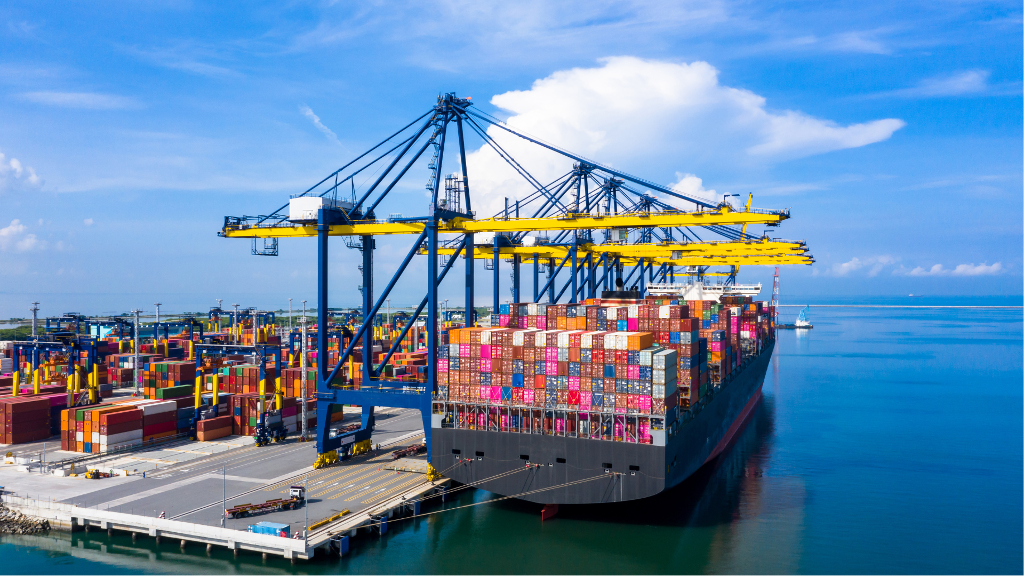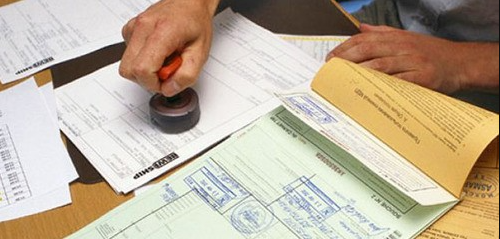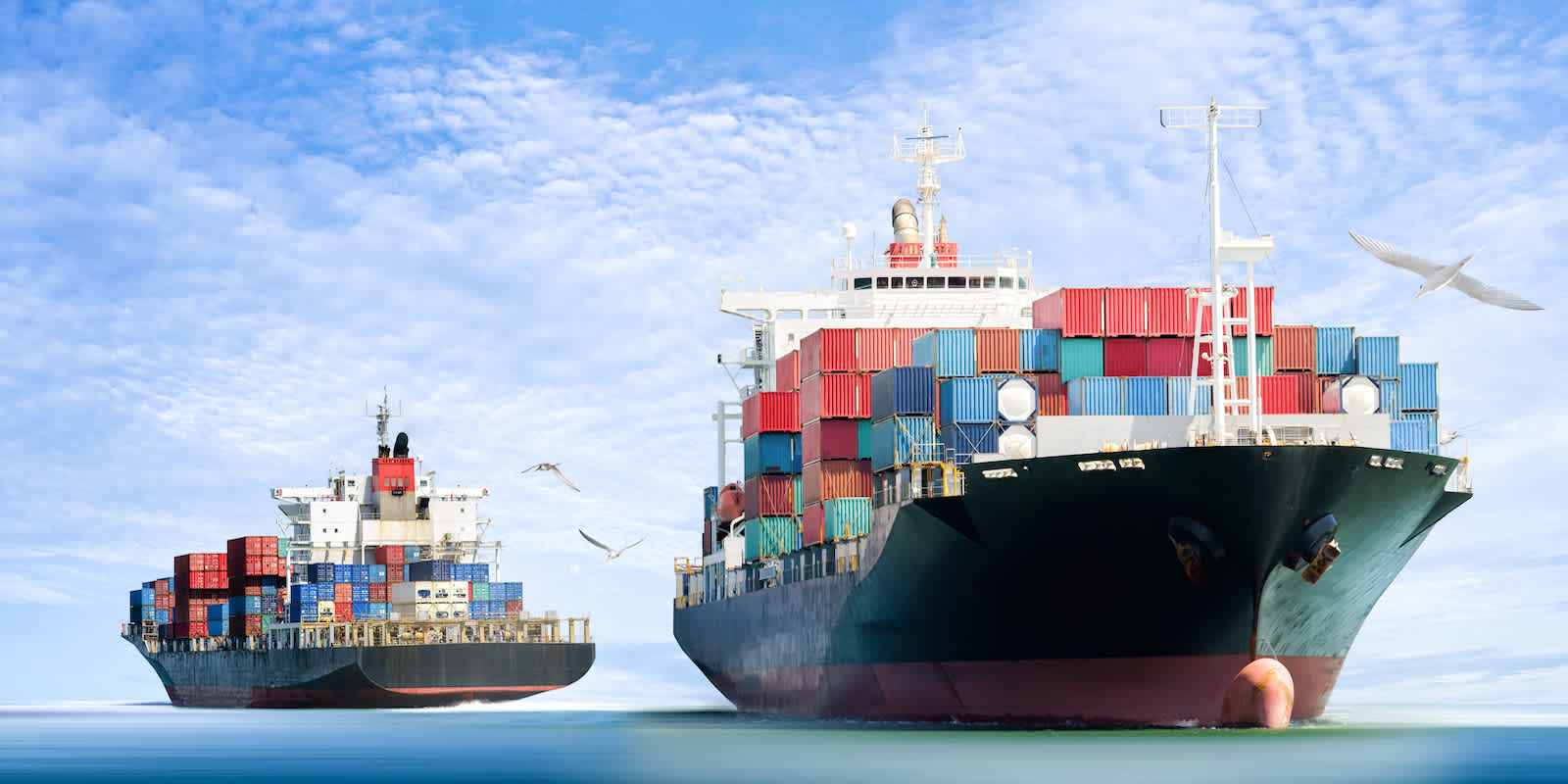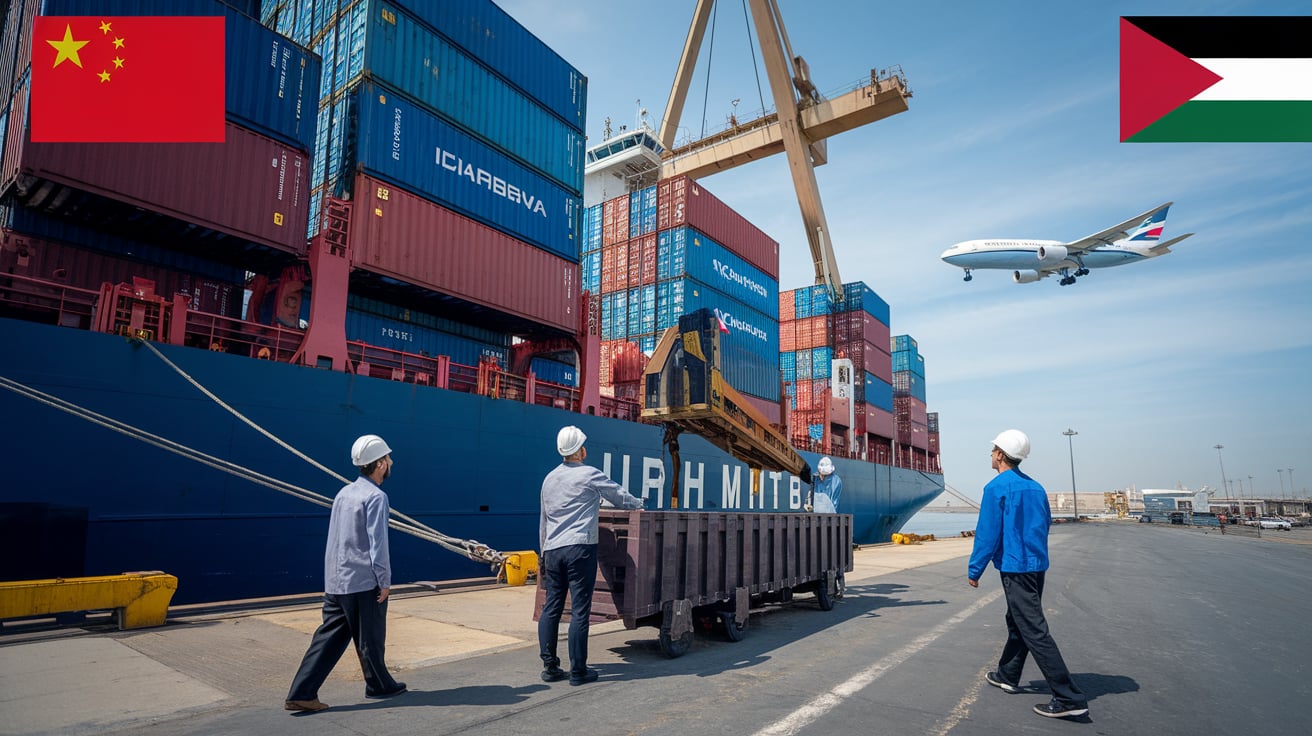Importing goods from China to Iraq can be a rewarding venture for businesses looking to expand their product offerings or tap into new markets. However, understanding the import procedure is crucial to ensure a seamless transaction. This process involves various steps, including selecting an appropriate shipping method, preparing necessary documentation, and complying with local regulations. It’s essential to have a robust logistics partner to navigate these complexities. In this blog, we will outline the key components of the import procedure from China to Iraq, helping you to effectively manage your international trade.
Related Article : Shipping From China To Iraq

Choosing a Shipping Method
When it comes to importing goods, selecting the right shipping method is one of the most critical decisions you will make. Each option has its advantages and disadvantages, depending on your specific needs like budget, time, and type of goods.
Air Freight
Air freight is one of the fastest shipping methods, making it ideal for time-sensitive shipments. Although it tends to be more expensive than other methods, it ensures that your products arrive quickly and safely. This option is particularly beneficial for high-value items or perishable goods. If you’re considering air freight, make sure to factor in the associated costs, including airport taxes and customs duties.
Sea Freight
Sea freight is a popular choice for bulk shipments and larger goods. It is generally more cost-effective than air freight, especially for transporting large quantities over long distances. However, the transit time is longer, which may not be suitable for urgent deliveries. When choosing sea freight, you will need to consider port fees and the potential for delays due to weather or port congestion.
Express Shipping
Express shipping is a premium option that combines speed and convenience. This service is often provided by courier companies and guarantees delivery within a specific timeframe, usually 1-3 days. While this option can be expensive, it is perfect for urgent shipments or small packages. Make sure to compare prices from different providers to find the best deal.
Door-to-Door Service
Door-to-door service offers a comprehensive solution by handling the entire shipping process, from pickup at the supplier’s location in China to delivery at your doorstep in Iraq. This option is the most convenient for businesses that want to minimize their logistical workload. It typically includes customs clearance and other necessary procedures, allowing you to focus on your core business activities.

Shipping From China to Middle East Countries:
- Shipping from China to Saudi Arabia
- Shipping from China to UAE
- Shipping from china to KUWAIT
- Shipping From China To EGYPT
- Shipping from China to Bahrain
- Shipping From China To Jordan
- Shipping From China To Israel
- Shipping from China to Qatar
- Shipping From China To IRAQ
- Shipping from China to Iran
Documentation and Paperwork

Proper documentation is essential for a successful import procedure. Each document serves a specific purpose and helps ensure compliance with legal and regulatory requirements.
Commercial Invoice
The commercial invoice is a critical document that provides detailed information about the goods being imported, including the product description, quantity, price, and total value. It serves as proof of the transaction and is required for customs clearance.
Certificate of Origin
A certificate of origin verifies the country where the goods are manufactured. This document may be required by Iraqi customs to determine applicable tariffs and trade regulations. Ensure that the certificate is signed by a relevant authority, such as a chamber of commerce.
Bill of Lading
The bill of lading is a legal document issued by the shipping company that acts as a receipt for the goods and outlines the terms of the shipment. It serves as proof of ownership and is essential for claiming the goods upon arrival in Iraq.
Packing List
The packing list details the contents of each package being shipped. It includes information such as the dimensions, weight, and packaging type. This document helps customs officials inspect the shipment more efficiently and ensures that everything is accounted for upon delivery.
Other Required Documents
Depending on the type of goods being imported, additional documents may be required. These can include import permits, licenses, and health certificates, especially for food or pharmaceutical products. Always consult with your logistics provider to ensure that you have all necessary documents prepared to avoid delays in customs clearance.
Customs Clearance Process

The customs clearance process is a crucial step in the import procedure, ensuring that your goods comply with local laws and regulations before entering Iraq. This process involves several key actions, including the submission of required documents, understanding customs duties and taxes, classifying goods with the appropriate HS codes, and taking into account any special considerations for certain products.
Submission of Documents
Once your shipment arrives in Iraq, the first step in the customs clearance process is the submission of documents. This includes the commercial invoice, certificate of origin, bill of lading, packing list, and any other necessary documentation. It is vital to ensure that all documents are accurate and complete to avoid delays. You may also need to provide additional information as requested by the customs officials to facilitate the clearance process.
Customs Duties and Taxes
The next step involves calculating the customs duties and taxes applicable to your imported goods. These charges are imposed by the Iraqi government and are based on the value of the goods, shipping costs, and applicable tariffs. Understanding these costs in advance can help you budget for your importation effectively. It’s important to keep in mind that customs duties and taxes must be paid before your goods can be released for delivery.
HS Code Classification
The HS code classification is a standardized system used to identify and categorize goods for customs purposes. Each product is assigned a unique code that determines the applicable duty rates and regulatory requirements. Accurately classifying your goods is critical, as misclassification can lead to fines, delays, and increased costs. Make sure to work with your customs broker or freight forwarder to ensure that your goods are classified correctly according to the Harmonized System (HS) codes.
Special Considerations for Certain Products
Certain products may have special considerations during the customs clearance process. For example, items such as pharmaceuticals, food products, electronics, and textiles may be subject to additional regulations, inspections, or labeling requirements. It’s essential to be aware of these special considerations and prepare any additional documentation required to ensure compliance. Engaging a knowledgeable customs broker can help you navigate these complexities efficiently.
Customs Duties and Taxes
Understanding customs duties and taxes is essential for successfully importing goods into Iraq. These costs can significantly impact your overall import expenses and should not be overlooked.
General Tariff Rates
The general tariff rates are standard duties applied to various goods imported into Iraq. These rates vary depending on the product category and can be found in the Iraqi customs tariff schedule. Businesses must familiarize themselves with these rates to accurately calculate their costs and pricing strategies. For accurate and up-to-date information, refer to the Iraqi Customs Authority’s official website or consult with a customs broker.
Product-Specific Rates
In addition to general tariff rates, there may be product-specific rates that apply to certain categories of goods. For example, certain products may be subject to reduced tariff rates as part of trade agreements or incentives for local production. It’s important to research and understand these product-specific rates to maximize your savings and ensure compliance with Iraqi customs regulations.
Recent Changes in Duty Structure
The recent changes in duty structure can affect your import costs and strategies. Governments may adjust tariffs and taxes based on economic policies, trade agreements, or global market trends. Staying informed about these changes is crucial for businesses engaged in international trade. Regularly checking updates from the Iraqi Customs Authority and consulting experts in international shipping can help you navigate any new regulations or changes in duty structures effectively.
By understanding the customs clearance process, port of entry considerations, and the intricacies of customs duties and taxes, you can enhance your import strategy from China to Iraq. This knowledge allows for better planning, cost management, and ultimately a smoother import experience.
Challenges and Considerations
Entering the Iraqi market by importing goods from China presents numerous challenges and considerations that businesses must navigate to achieve success. Understanding these challenges can help prepare for potential obstacles.
Language Barriers
One of the significant challenges in importing goods to Iraq is the language barrier. English is not widely spoken in many areas, which can lead to miscommunication between suppliers, customs officials, and logistics providers. Misunderstandings can result in delays, incorrect documentation, and other complications. To mitigate this challenge, consider hiring bilingual professionals or working with local partners who can facilitate communication and ensure that all parties are on the same page.
Cultural Differences
Cultural differences may also pose challenges in the import process. Each country has its own customs, business practices, and negotiation styles. Understanding Iraqi business culture is essential for building strong relationships with suppliers and customs officials. This includes being aware of local customs such as hospitality norms, negotiation techniques, and the significance of personal relationships in business dealings. Adapting to these cultural nuances can enhance cooperation and result in smoother transactions.
Potential Delays
Importing goods into Iraq can sometimes lead to potential delays due to various factors, including customs inspections, transportation issues, or logistical challenges. For instance, customs clearance can take longer than expected if documentation is incomplete or if additional inspections are required. Additionally, infrastructure issues such as road conditions or port congestion can further prolong delivery times. Being proactive and allowing for extra time in your shipping schedule can help reduce the impact of these delays.
Dantful International Logistics Services:
- Dantful Ocean Freight Services
- Air Freight From China
- Amazon FBA Freight Forwarding
- WAREHOUSE Services
- One-Stop Customs Clearance Solution
- Cargo Insurance Services in China
- DDP Shipping Services By Dantful Logistics
- Out of Gauge Cargo Transportation Shipping Services
Tips for Smooth Importing
To enhance your importing experience and minimize potential challenges, consider these practical tips for smooth importing.
Working with Experienced Freight Forwarders
Engaging experienced freight forwarders can be invaluable in navigating the complexities of international shipping. A reliable freight forwarder has the expertise to manage logistics, handle customs clearance, and provide guidance on regulatory compliance. They can also help you identify the most cost-effective shipping methods and ensure that your goods arrive on time. Building a strong partnership with a reputable freight forwarder like Dantful International Logistics can significantly streamline your import process.
Ensuring Accurate Documentation
One of the most critical aspects of successful importing is ensuring accurate documentation. All paperwork, including the commercial invoice, certificate of origin, and bill of lading, must be completed correctly to avoid delays in customs clearance. It’s advisable to create a checklist of required documents and verify their accuracy before shipment. Regular communication with your suppliers and logistics partners can help clarify any uncertainties and ensure that all necessary documents are in order.
Understanding Iraqi Import Regulations
To facilitate a smooth importing process, it’s essential to have a thorough understanding of Iraqi import regulations. This includes being aware of any specific requirements for different product categories, such as health and safety regulations for food products or technical specifications for electronics. Familiarizing yourself with the latest laws and regulations can help prevent unforeseen issues at customs and ensure compliance with local laws.
FAQs
What are the main documents required for importing goods into Iraq?
The main documents required include a commercial invoice, certificate of origin, bill of lading, packing list, and any other product-specific certifications.
How long does the customs clearance process take in Iraq?
The customs clearance process can vary depending on several factors, but it typically takes between a few days to several weeks. Proper documentation can help expedite this process.
Are there any restrictions on importing certain products into Iraq?
Yes, there are restrictions on certain products, including specific food items, pharmaceuticals, and hazardous materials. It’s crucial to research and comply with local regulations before importing.
References
- Iraqi Customs Authority – Overview of Import Procedures
- World Bank – Doing Business in Iraq

Young Chiu is a seasoned logistics expert with over 15 years of experience in international freight forwarding and supply chain management. As CEO of Dantful International Logistics, Young is dedicated to providing valuable insights and practical advice to businesses navigating the complexities of global shipping.




















 Afrikaans
Afrikaans Shqip
Shqip አማርኛ
አማርኛ العربية
العربية Հայերեն
Հայերեն Azərbaycan dili
Azərbaycan dili Euskara
Euskara Беларуская мова
Беларуская мова বাংলা
বাংলা Bosanski
Bosanski Български
Български Català
Català Cebuano
Cebuano Chichewa
Chichewa 简体中文
简体中文 繁體中文
繁體中文 Corsu
Corsu Hrvatski
Hrvatski Čeština
Čeština Dansk
Dansk Nederlands
Nederlands English
English Esperanto
Esperanto Eesti
Eesti Filipino
Filipino Suomi
Suomi Français
Français Galego
Galego ქართული
ქართული Deutsch
Deutsch Ελληνικά
Ελληνικά Kreyol ayisyen
Kreyol ayisyen Harshen Hausa
Harshen Hausa Ōlelo Hawaiʻi
Ōlelo Hawaiʻi עִבְרִית
עִבְרִית हिन्दी
हिन्दी Hmong
Hmong Magyar
Magyar Íslenska
Íslenska Igbo
Igbo Bahasa Indonesia
Bahasa Indonesia Gaeilge
Gaeilge Italiano
Italiano 日本語
日本語 Basa Jawa
Basa Jawa ಕನ್ನಡ
ಕನ್ನಡ Қазақ тілі
Қазақ тілі ភាសាខ្មែរ
ភាសាខ្មែរ 한국어
한국어 كوردی
كوردی Кыргызча
Кыргызча ພາສາລາວ
ພາສາລາວ Latin
Latin Latviešu valoda
Latviešu valoda Lietuvių kalba
Lietuvių kalba Lëtzebuergesch
Lëtzebuergesch Македонски јазик
Македонски јазик Malagasy
Malagasy Bahasa Melayu
Bahasa Melayu മലയാളം
മലയാളം Maltese
Maltese Te Reo Māori
Te Reo Māori मराठी
मराठी Монгол
Монгол ဗမာစာ
ဗမာစာ नेपाली
नेपाली Norsk bokmål
Norsk bokmål پښتو
پښتو فارسی
فارسی Polski
Polski Português
Português ਪੰਜਾਬੀ
ਪੰਜਾਬੀ Română
Română Русский
Русский Samoan
Samoan Gàidhlig
Gàidhlig Српски језик
Српски језик Sesotho
Sesotho Shona
Shona سنڌي
سنڌي සිංහල
සිංහල Slovenčina
Slovenčina Slovenščina
Slovenščina Afsoomaali
Afsoomaali Español
Español Basa Sunda
Basa Sunda Kiswahili
Kiswahili Svenska
Svenska Тоҷикӣ
Тоҷикӣ தமிழ்
தமிழ் తెలుగు
తెలుగు ไทย
ไทย Türkçe
Türkçe Українська
Українська اردو
اردو O‘zbekcha
O‘zbekcha Tiếng Việt
Tiếng Việt Cymraeg
Cymraeg יידיש
יידיש Yorùbá
Yorùbá Zulu
Zulu